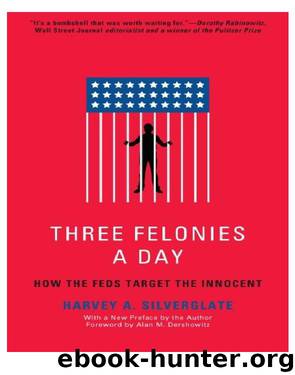Three Felonies a Day by Harvey Silverglate

Author:Harvey Silverglate
Language: eng
Format: epub, mobi
Publisher: Encounter Books
Published: 2011-05-09T16:00:00+00:00
Perhaps these statements were viewed by a skeptical press corps as standard for lawyers trying to defend their indicted clients in the court of public opinion. However, another way of viewing the matter is that the lawyers were trying, probably in vain, to touch upon issues fundamental to the fairness and accuracy of the prosecution.
The indictment charged a single over-arching conspiracy to design and market, and conceal from the IRS, phony tax shelters. The conspiracy charge was broad enough to include, as well, acts to obstruct the operations of the IRS. This was an obvious attempt to try to insulate the indictment from a defense that the shelters themselves were legitimate. Yet notwithstanding the breadth of the indictment and the fact that the government had the newly contrite accounting firm on its side, claiming that everyone knew that the tax shelters were unlawful all along, the ongoing legitimate dispute over this central question obviously continued to gnaw at the prosecutors’ confidence, especially in view of the feisty resolve shown by some of the defendants and their lawyers to fight the charges.
Almost predictably, the DOJ issued a “superseding indictment” on October 17, 2005, adding not only ten additional defendants (for a total of 19), but also 45 new counts (for a total of 46), including charges for obstruction and making false statements to the IRS. These obstruction counts were separate from the conspiracy charge, an apparent further step to rescue at least part of the indictment just in case the defendants were able to demonstrate to a jury that the shelters were sufficiently legitimate to defeat the standard for criminal IRS fraud. The government was taking no chances that the truth might wreck its ability to get a conviction.
The government thus put together a case which, even if wrong on the merits of its fraud claims concerning the tax shelters themselves, would cause the defendants to begin to tumble like dominoes. “It’s a lot like the scene in ‘The Godfather’ where Marlon Brando explains how he’s going to make an offer they can’t refuse,” Joseph Grundfest, a Stanford University professor of business and ethics and former SEC commissioner, told The Wall Street Journal.28 The New York Times quoted E. Lawrence Barcella Jr., a lawyer representing one of the new defendants, as reminding the world that no court had yet determined that the shelters were illegal.29 However, this inconvenient, stubborn fact appeared to matter less and less as the government’s successful, though dubious, strategy unfolded.
In time, various individuals involved in the shelters and named in this or related indictments began to fold, plead guilty, and agree to testify. On March 27, 2006, David Rivkin, a former KPMG partner in San Diego named in the indictment, pleaded guilty and agreed to cooperate. Rivkin stated, in open court during his plea, that he knew the tax returns to be false at the time for some of the firm’s wealthy clients.
Judge Lewis A. Kaplan of the United States District Court for the Southern District of
Download
This site does not store any files on its server. We only index and link to content provided by other sites. Please contact the content providers to delete copyright contents if any and email us, we'll remove relevant links or contents immediately.
| Anthropology | Archaeology |
| Philosophy | Politics & Government |
| Social Sciences | Sociology |
| Women's Studies |
The Secret History by Donna Tartt(19088)
The Social Justice Warrior Handbook by Lisa De Pasquale(12190)
Thirteen Reasons Why by Jay Asher(8909)
This Is How You Lose Her by Junot Diaz(6886)
Weapons of Math Destruction by Cathy O'Neil(6279)
Zero to One by Peter Thiel(5802)
Beartown by Fredrik Backman(5754)
The Myth of the Strong Leader by Archie Brown(5507)
The Fire Next Time by James Baldwin(5444)
How Democracies Die by Steven Levitsky & Daniel Ziblatt(5218)
Promise Me, Dad by Joe Biden(5153)
Stone's Rules by Roger Stone(5088)
A Higher Loyalty: Truth, Lies, and Leadership by James Comey(4963)
100 Deadly Skills by Clint Emerson(4925)
Rise and Kill First by Ronen Bergman(4788)
Secrecy World by Jake Bernstein(4753)
The David Icke Guide to the Global Conspiracy (and how to end it) by David Icke(4718)
The Farm by Tom Rob Smith(4509)
The Doomsday Machine by Daniel Ellsberg(4490)
